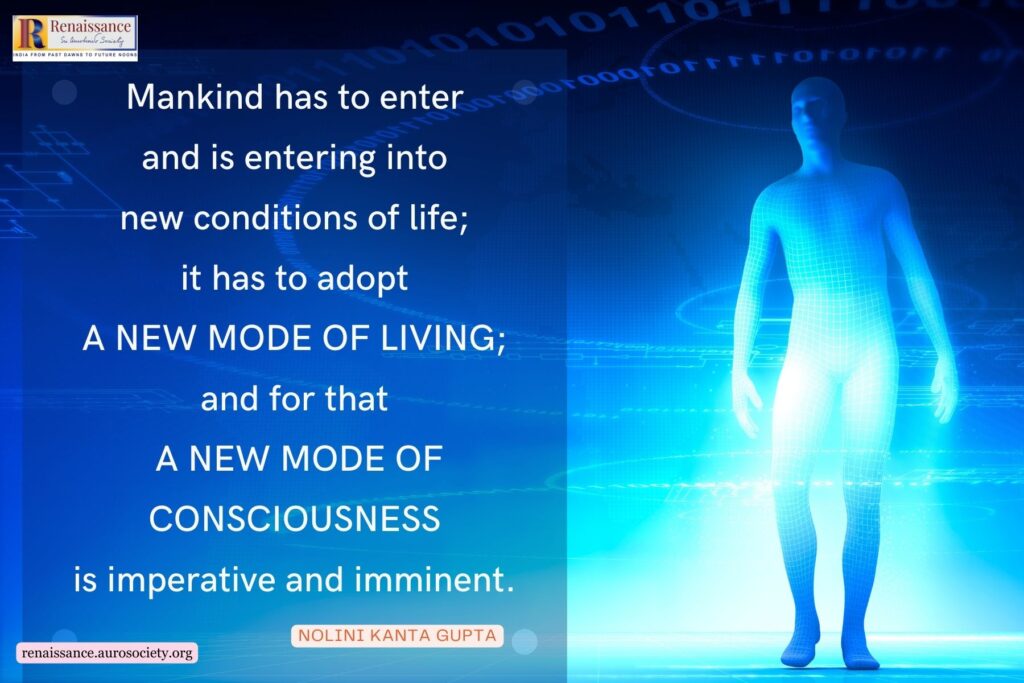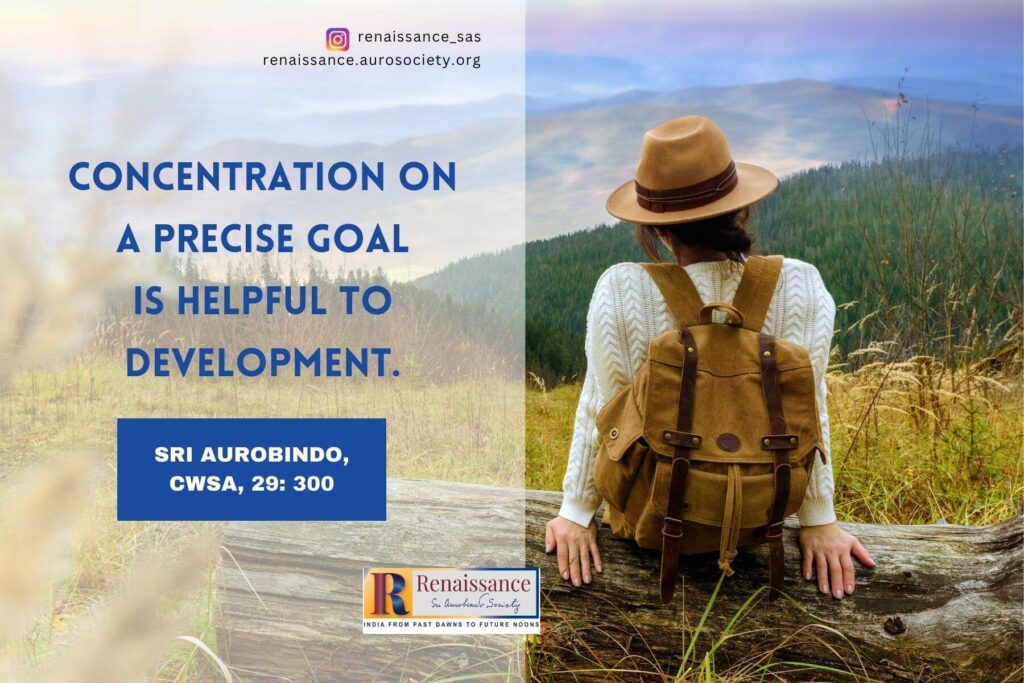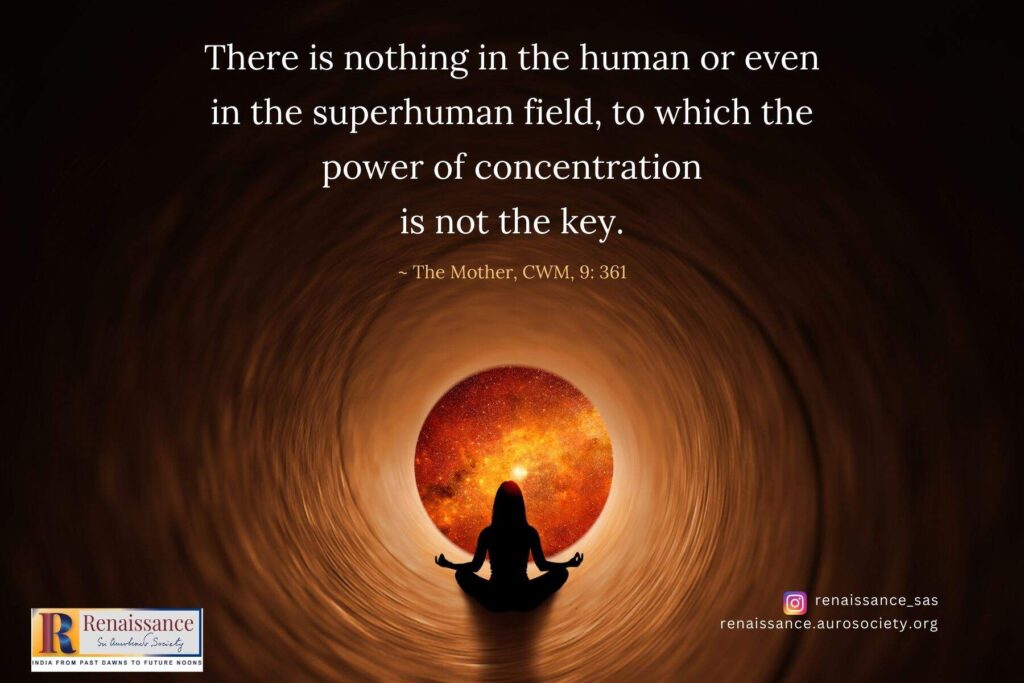Editor’s note: In these passages the Mother describes bodily equality and emphasizes the necessity of equanimity in the body to receive the divine forces. She also explains how to practice bodily equality at the cellular level.

What is bodily equality?
Question: What is it that you call “the basis of equanimity in the external being”?
The Mother:
It is good health, a solid body, well poised; when one does not have the nerves of a little girl that are shaken by the least thing; when one sleeps well, eats well…. When one is quite calm, well balanced, very quiet, one has a solid basis and can receive a large number of forces.
If anyone among you has received spiritual forces, forces of the Divine Ananda, for example, he knows from experience that unless he is in good health he cannot contain them, keep them. He begins to weep and cry, gets restless to expend what he has received. He must laugh and talk and gesticulate, otherwise he cannot keep them, he feels stifled. And so by laughing, weeping, moving about he throws out what he has received.
To be well balanced, to be able to absorb what one receives, one must be very quiet, very calm. One must have a solid basis, good health. One must have a very solid basis. That is very important.
Question: What is the difference between outer equality and the equality of the soul?
The Mother:
The equality of the soul is a psychological thing. It is the power to bear all happenings, good or bad, without being sad, discouraged desperate, upset. Whatever happens, you remain serene, peaceful. The other is the equality in the body. It is not psychological, it is something material; to have a physical poise, to receive forces without being troubled.
The two are equally necessary if one wants to progress on the path. And other things still. For example, a mental poise; such that all possible ideas, even the most contradictory, may come from all sides without one’s being troubled. One can see them and put each in its place. That is mental poise.
– The Mother (CWM, Vol. 5, pp. 22-23)
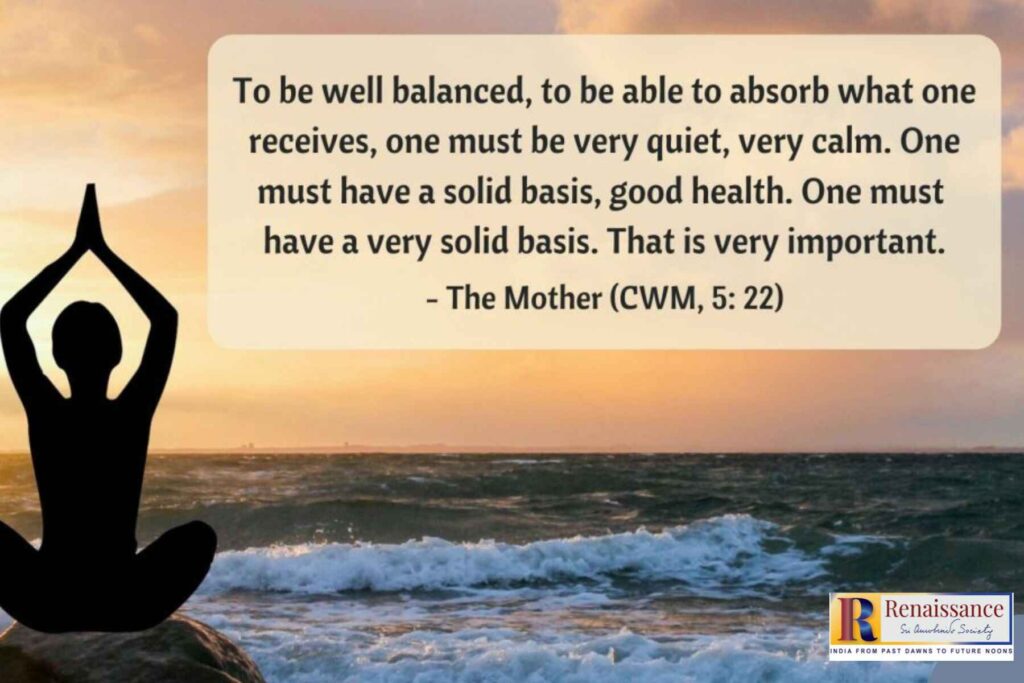

Equanimity is necessary to receive the divine forces
You must have a strong body and strong nerves. You must have a strong basis of equanimity in your external being.
If you have this basis, you can contain a world of emotion and yet not have to scream it out. This does not mean that you cannot express your emotion, but you can express it in a beautiful harmonious way. To weep or scream or dance about is always a proof of weakness, either of the vital or the mental or the physical nature; for on all these levels the activity is for self-satisfaction.
One who dances and jumps and screams has the feeling that he is somehow very unusual in his excitement; and his vital nature takes great pleasure in that.
If you have to bear the pressure of the Divine Descent, you must be very strong and powerful, otherwise you would be shaken to pieces. Some persons ask, “Why has not the Divine come yet?” Because you are not ready.
If a little drop makes you sing and dance and scream, what would happen if the whole thing came down? Therefore do we say to people who have not a strong and firm and capacious basis in the body and the vital and the mind, “Do not pull”, meaning “Do not try to pull at the forces of the Divine, but wait in peace and calmness.” For they would not be able to bear the descent.
But to those who possess the necessary basis and foundation we say, on the contrary, “Aspire and draw.” For they would be able to receive and yet not be upset by the forces descending from the Divine.
– The Mother (CWM, Vol. 3, pp. 11)
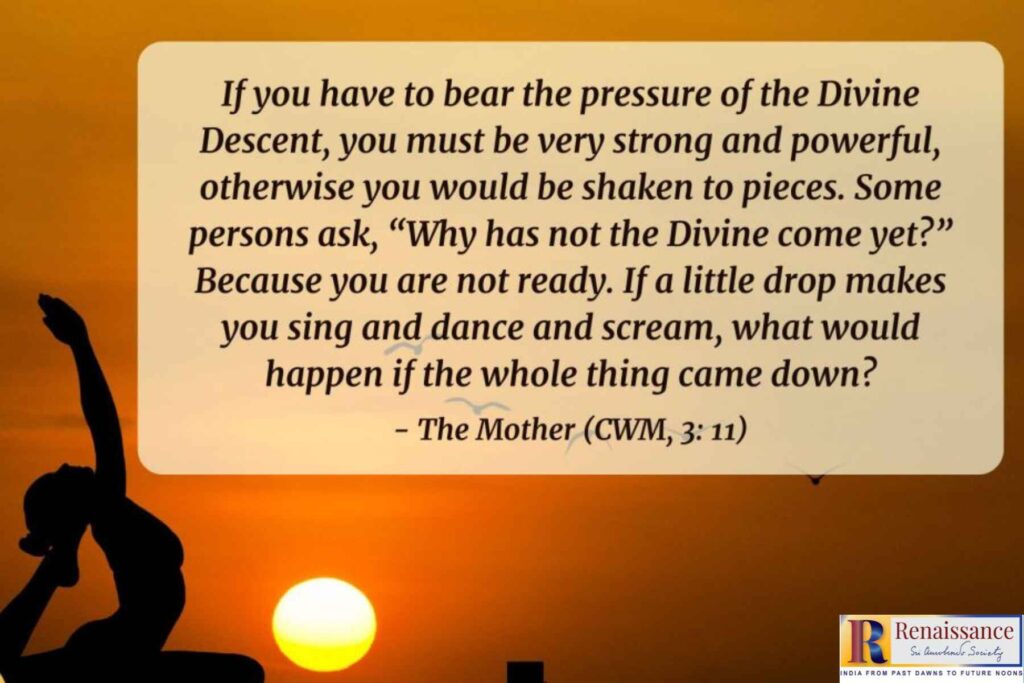

Read:
The Perfect Equality in Integral Yoga
How to practice equality in the body?
Suppose you have a pain somewhere; the instinct (the instinct of the body, the instinct of the cells) is to shrink and to seek to reject—that is the worst thing, that increases it invariably. Therefore, the first thing to teach the body is to remain immobile, to have no reaction; above all, no shrinking, not even a movement of rejection—a perfect immobility. That is bodily equality. A perfect immobility.
After the perfect immobility comes the movement of inner aspiration (I always speak of the aspiration of the cells—I use words for what has no word, but there is no other way of expressing it), the surrender, that is to say, the spontaneous and total acceptance of the supreme Will (which one does not know).
Does the All-Will want things to go this way or that way, that is to say, towards the disintegration of some elements or towards. . . ? And there also, there are infinite shades: there is the passage between two heights (I speak of cellular realisations, do not forget that); I mean one has a certain inner poise, a poise of movement, of life, and it is understood that while passing from one movement to a higher movement, almost always there occurs a descent and then an ascent—it is a transition.
Then, does the shock you receive push you downward to make you rise again or does it push you downward to abandon the old movements?—for there are cellular ways of being that should disappear in order to give place to other ways. There are others that tend to rise upward again with a higher harmony and organisation. This is the second point.
And one must wait and see, without postulating in advance what should be. Above all, there is the desire—the desire to be at ease, the desire to be in peace, all that—which must absolutely cease, disappear.
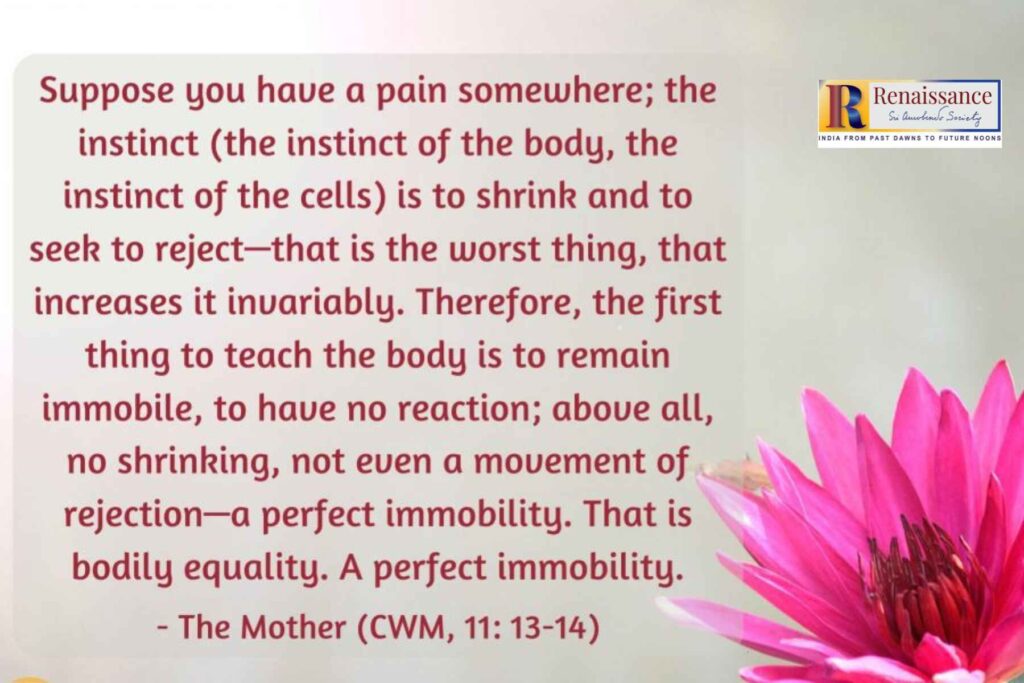
One must be absolutely without reaction, like this (gesture with palms open, of motionless offering upward). And then, when one is like that (“one” means the cells), after a time comes the perception of the category to which the movement belongs, and one has only to follow in order to see whether it is something that has to disappear and be replaced by another thing (which is not known for the moment) or it is something that has to be transformed.And so on. All the while it is like that.
All this is to tell you that the thought is absolutely immobile; everything happens directly: a matter of vibration. Well, it is only in this way that one can know what one should do.
If the thing passes through the mind, especially this physical thinking which is absolutely imbecile, absolutely, you cannot know; so long as it is working you are always led to do what you should not do, to have particularly the bad reaction—the reaction that helps the forces of disorder and obscurity instead of counteracting them.
And I am not speaking of anxiety, because for a very long time now there has been no anxiety in my body—a long time, many years—but anxiety is like swallowing a cup of poison. This is what is called physical yoga.
One must overcome all that. And the only way to do it: at every second all the cells must be (gesture of motionless offering upward) in an adoration, in an aspiration—an adoration, an aspiration, an adoration… and nothing else.
Then after a time there is also delight, then that ends in blissful trust. When this trust is established all will be well. But… it is easy to say, it is much more difficult to do. Only, for the moment I am convinced that this is the only means, there is no other.
– The Mother (CWM, Vol. 11, pp. 13-15)

Also read:
Equality and Supermind: The Mother Explains
~ Design: Raamkumar

